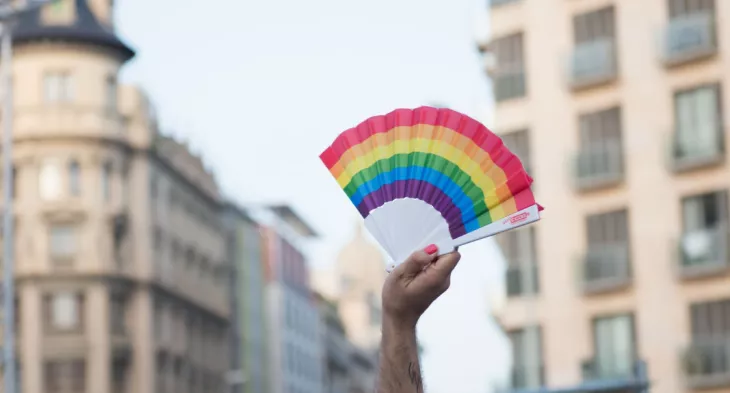Social rights

Respect for diversity
Barcelona is an open city where respect for personal identity is a fundamental principle. The overwhelming majority of Barcelona’s population have a long tradition of showing a respectful attitude towards diversity.
Everyone in the city is entitled to enjoy public space under equal conditions and to be fully respected; action is taken against any form of discrimination, whether on the grounds of origin, culture, religion, sexual orientation or gender identity.
For further information, visit the Office for Non-Discrimination, which safeguards human rights on a local level.
Sexual and gender diversity
Barcelona is one of the leading cities in the world in promoting the rights of lesbians, gays, transsexuals, bisexuals and intersexuals (LGBTI). This community enjoys a pleasant life throughout Barcelona’s 10 districts, while there is also an important LGBTI shopping and leisure scene in the Gaïxample area, in the heart of Barcelona’s Eixample district.
Find out more about LGBTI life in Barcelona!
The Barcelona LGBTI Centre is a very useful facility offering advice to arriving members of the LGBTI community and helping them take their first steps and enjoy their new life in the city.
Also know the Municipal LGBTI Council, an advisory and sectoral participatory body which helps foster equal rights, freedom and social recognition of LGBTI citizens. Check out the website and discover all the local entities and associations making up the council.
Services against gender violence
Social rights also means equality and non-discrimination on the grounds of gender.
Women in Barcelona have social-support networks that offer opportunities and champion equal rights for them. Women are also offered legal advice and counselling, training courses and other activities and programmes against gender violence. Get to know the Women's Support and Information Points (PIAD)
Barcelona against gender violence: services are free and confidential for users, addressing gender violence in all its forms: physical, psychological, sexual, obstetric and the violation of sexual and reproductive rights, economic, digital, pastoral and violence towards those close to people who suffer situations of gender violence.
Find out all about this on the following website: Women and Feminism
Religious worship
Historically and traditionally, the overwhelming majority of Barcelona’s population is Roman catholic. Even so, Catalonia exudes a respectful atmosphere for followers of other religions. In fact the city and its surroundings have public places of worship for the major religious groups, such as Anglicans, Protestants, Muslims, Buddhists, Jehovah's Witnesses, Hindus, Eastern Catholics, Seventh-Day Adventists, Taoists, Sikhs and Jews.
For further information, visit the Office of Religious Affairs.
Refugees
Abandoning a country due to war, humanitarian crises and political persecution are among the reasons behind the displacement of many people set on rebuilding their lives.
Barcelona aims to be a welcoming city that offers refugees help under its “Barcelona, Refuge City” plan.
The Care Service for Immigrants, Emigrants and Refugees (SAIER), which is free and specializes in international mobility, has been in operation since 1999. It provides information and advice on useful issues for newcomers, such as asylum, immigration and voluntary return.
It also carries out numerous activities to promote positive coexistence and social cohesion through inter-cultural initiatives, thereby helping migrants to integrate. Find out about these activities from the Barcelona Inter-culturality Programme (only available on Spanish and Catalan).
People with disabilities
Barcelona is one of the European cities with the most accessible urban environments for people with disabilities. Practically 90% of its streets are accessible for wheelchair users and a large number of traffic lights are adapted for people with visual impairment.
All buses and 90% of the metro stations are accessible, the rest are being refurbished to become accessible.
What is more, Barcelona also has other special services, such as help on beaches in the summer, adapted municipal-information services and accessible sports facilities and play areas.
You will find further information on Living in Barcelona - Accessibility.
Elderly and dependent people
Foto de una persona mayor en casa con el dispositivo de teleasistencia o de una persona mayor atendida por alguien que la ayuda con la comida.
Elderly and dependent people have several social services in Barcelona.
Home assistance is offered above all (but not exclusively) to the elderly and families with difficulties performing some activities (personal hygiene, preparing food, administering medicines, personal mobility or house cleaning).
There is also a telecare service. Users have a device they can activate should risk situations occur in their home. It provides ongoing assistance 24 hours a day and immediate action in the event of an emergency.
In addition, elderly people or people with disabilities who meet certain requirements can obtain a pink card, which provides them with free access to or reduced fares on metropolitan public transport.
And there is a travel programme for elderly passengers that the Institute for Elderly People and Social Services (IMSERSO, which stands for Institut de Majors i Serveis Socials) offers. Barcelona City Council reserves 2,000 places on the programme and partly subsidises them for pink cardholders.
For further information, visit the following websites:


